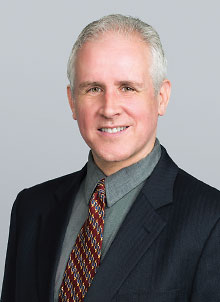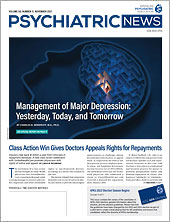The settlement of a class action lawsuit brought by some 50,000 physicians over UnitedHealthcare’s repayment demands sends a strong message to insurers and confers important and often overlooked rights to out-of-network physicians and other providers, according to a lawyer who worked on the case.
The lawsuit alleged that repayment demands sent to out-of-network providers failed to provide meaningful opportunities to challenge, obtain detailed plan information, or appeal them, as required by the federal law that governs private employer benefit plans, the Employee Retirement Income Security Act of 1974 (ERISA). The settlement covers any out-of-network clinician who submitted a claim to UnitedHealthcare and received a demand for repayment after January 2005.
D. Brian Hufford, J.D., who is an expert in ERISA law and partner with Zuckerman Spaeder LLP and represented clinicians in this case, told Psychiatric News that it is a widespread and lucrative practice for payors to perform postpayment audits and demand repayment of claims, also known as “takebacks” or “clawbacks,” from providers, both in network and out of network. Industrywide, insurers are estimated to claw back more than $1 billion a year from providers in repayment demands.
Hufford estimated that UnitedHealthcare issues 1.6 million repayment demands a year. For out-of-network providers who don’t repay the money, UnitedHealthcare typically subtracts the funds from subsequent payments to the provider, even from unrelated claims. Takebacks can be very disruptive and difficult to dispute because unlike the initial claims, physicians are often given no rationale for them, and there is no way to check their accuracy.
The class action didn’t seek the repayment of any money, but rather sought to require UnitedHealthcare to provide out-of-network clinicians with specific notice and appeals rights under ERISA in connection with past and future repayment demands. These include the specific reason for the adverse determination, reference to the specific plan provisions upon which the determination is based, and a description of the plan’s review procedures and applicable time limits.
For the class action, one particular repayment demand was designated to serve as the basis for all of the claims. Integrated Orthopedics Inc., a Chicago-based supplier of postsurgical supplies, was paid $849.16 by UnitedHealthcare for care provided to a patient. The insurer’s computerized audit correctly flagged the patient as not having received the required preauthorization. However, instead of applying a 10% payment as provided for under the patient’s plan, United clawed back the entire $849.16.
UnitedHealthcare allegedly ignored or denied requests for more information, an explanation of its reasoning, and copies of the governing plan documents. After a lawsuit was filed, UnitedHealthcare eventually agreed to withdraw its repayment demand.
The settlement of Integrated Orthopedics Inc. v. UnitedHealth Group, et. al., stipulates that for the claims in question and for new claims going forward, repayment demands must treat out-of-network providers as “Authorized Representatives” under ERISA and grant them ERISA due protections, so long as providers furnish United with an Authorized Representative form completed by the patient. UnitedHealthcare denied any wrongdoing in the settlement.
Going forward, ERISA should provide substantial protection for out-of-network clinicians billing commercial insurance plans on behalf of their patients, Hufford said. “For physicians who exercise their right to appeal a repayment demand, United must now defer taking further steps to recover alleged overpayments until the appeals process has been completed.”
However, Hufford advises clinicians to obtain proper authorization by ensuring that all intake forms designate them as an Authorized Representative. This allows them to pursue appeals or take appropriate legal actions, as necessary, on behalf of their patients. “The insurer may still refuse to cooperate with the provider, but this will substantially strengthen the ability of the provider to push back against these types of repayment demands.” Authorized Representative designations can also be obtained by the provider from the patient after a repayment demand, he said.
The settlement specifically involves out-of-network providers, but Hufford said, “We would encourage all providers to take full advantage of the appeal rights they are given under their contracts. However, it is more difficult for in-network providers to push back, because they have entered into agreements that allow such audits and repayment demands.”
Other insurers might also fall in line with this ruling. “It is unclear that this settlement will impact other insurers, but the decisions in the case strongly support our view that ERISA should govern repayment demands like this and that physicians should be entitled to due-process protections. We obtained certification of a nationwide class of out-of-network providers who were subjected to repayment demands by United. That should send a strong message to all insurers engaged in such conduct,” he said. ■
The official web site for the class action is
here.

